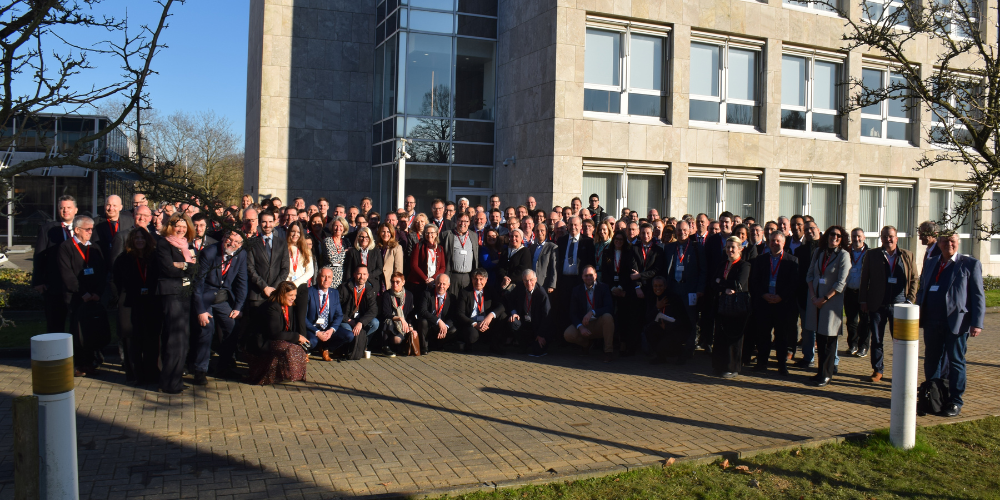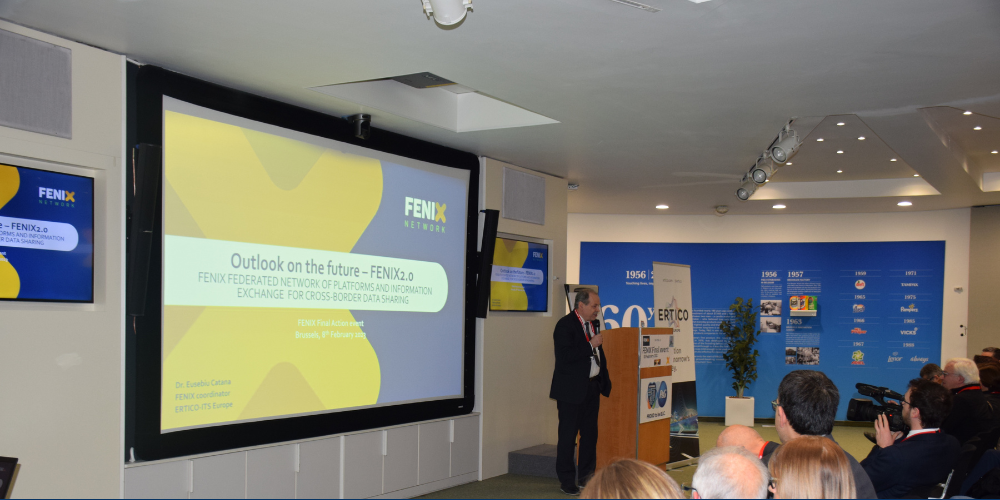
The FENIX project was launched in 2019 with the ambition to create the first European federated architecture for data sharing. In the four years that followed, the 45-member project consortium overcame considerable challenges to deliver high-quality results, culminating in an impressive final public event last week. The project’s final open event took place on 8 February at the P&G INQBet campus in Grimbergen. Over 150 participant were onsite to witness and experience the achievements of FENIX, by way of presentations, panel discussions and demonstrations.
A successful final event for a successful project
The FENIX final event provided an opportunity to gain insights into what the project achieved and how the consortium’s activities were orchestrated at a pan-European level to meet its objectives. More than 150 people participated in the final event last week to share the project’s achievements and take in their technological and regulatory impact.
In the opening session of the event, distinguished speakers delivered keynote addresses and presentations, which also highlighted the relevance of the project in the global logistics arena. The speakers, who acknowledged and appreciated FENIX’s role in accelerating the technological development of supply chains, included:
The Rhine-Alpine Corridor Coordinator, Mr Wojciechowski, highlighted the project’s role in digitalising freight transport along the EU core network corridors. He believes that increasing the sector efficiency by enabling B2A/B2B data sharing is a fundamental aspect that FENIX has addressed well.

Final conference and Pilot Sites marketplace
Mr Oscislowski expressed appreciation on behalf of the European Commission for the great steps ahead that the whole European Union can take in developing a better-functioning single market, a coordinated logistics system and interoperability, which, together with adapted regulation, will allow member states to face the current and future challenges of the transport sector. More specifically, Mr Oscislowski mentioned the supply constraints that the COVID pandemic and the invasion of Ukraine, for example caused, and how overarching projects such as FENIX can support EU governments and institutions to face short and medium term challenges.

Mr Oscislowski and Mr Wojciechowski speeches
During the day, consortium partners presented the main features of the projects and showcased the excellency of their efforts. Almost all of the project’s 11 pilot sites achieved increased productivity and a reduction of document exchange in their operations through FENIX. An average reduction of about 22% of CO2 emission in logistics operations was registered, directly linked to the project.

FENIX final event participants
A well-coordinated effort delivering excellence
One of the greatest challenges faced by the Project Coordinator, ERTICO’s Senior Manager of Innovation and Deployment Dr Eusebiu Catana, and the project management team was to connect 11 sub-projects into a comprehensive whole. 11 pilot sites worked on solutions to create the first European federated architecture for data sharing serving the European logistics community of shippers, service providers, mobility infrastructure providers, cities, and authorities. The overall goal has been to offer interoperability between any individual existing and future platforms in the logistics and supply chains in Europe and beyond.


Pilot Sites representatives
As project coordinator, Dr Catana’s intention has been to boost synergies at the consortium level in order to channel the joint work and develop ownership of the project’s results. He expressed satisfaction at how things went at the final event, saying, “Everything is possible when hard work, teamwork and confidence in one’s team are coordinated and well conveyed”.
FENIX legacy and the steps ahead
The European Commission is working on a single European e-identity and trusted wallet for all (eIDAS regulatory framework) that will be used also for transport document flows. This signals the great interest of institutions for digitalisation of transport and logistics, alongside with other sectors, and proves that FENIX has followed the right path for the last four years.
For this reason, the continuation of the project, which will concretise through the FENIX 2.0 initiative, will build on FENIX achievements and leverage the momentum that the final event generated. The new phase will revolve around a few pivots: trust (the data consumer must fully accept the data owner’s usage policy), decentralisation of data (data physically remains with the respective data owner until it is transferred to a trusted party), standardised interoperability, data markets (data-driven services that make use of data apps).
Dr Catana’s final message to the audience was full of ambition and purpose: “FENIX2.0 will continue what FENIX did and further will ensure for all partners a secure ecosystem of data providers and data consumers for optimal transport decisions within a safe framework to connect plug-and-play systems.” FENIX has been one of ERTICO’s highly valuable project whose impact will be felt through meaningful results in the coming years.

Dr Eusebiu Catana, Project Coordinator, presenting FENIX 2.0

The FENIX project is co-financed by the Connecting Europe Facility of the European Union